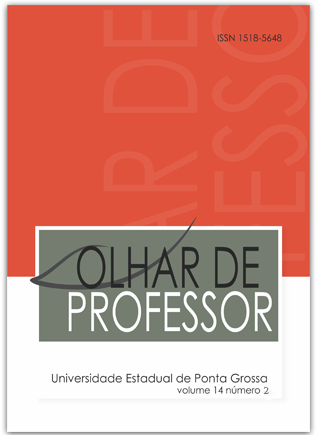A educação socioambiental e o princípio da responsabilidade para estudantes privados de liberdade - DOI: 10.5212/OlharProfr.v.14i2.0004
Main Article Content
Abstract
Pensar a educação para estudantes privados de liberdade nos dias atuais só faz sentido se for dotada de signifi cado enquanto processo de reinserção social e conectada com as transformações socioambientais e responsabilidade frente à sustentabilidade do planeta. Este artigo retrata, em essência, uma refl exão sobre a prática pedagógica no contexto prisional, a partir da educação socioambiental. Evidenciado pelo consumismo e individualismo, o momento nos leva a pensar o princípio da responsabilidade como necessidade de transformação, pela educação, na privação de liberdade, e a encarar as práticas relativas ao agir humano como desafi os possíveis. A educação no Sistema Penitenciário exige postura crítica e inovadora, de forma a propiciar, por meio de atitudes e prática pedagógica, a transformação social. Mesmo privado/a de liberdade, o/a estudante deve buscar o relacionamento harmonioso entre todas as formas de vida existentes no planeta, percebendo-se como parte desse processo. A retomada da capacidade humana em articular as ideias e ações que poderão transformar as degradações atuais em medidas práticas sustentáveis, permitindo a continuidade da vida no planeta e, principalmente, a própria existência humana, faz parte da metodologia do ensino de Biologia vivenciado no CEEBJA Mario Faraco, no estado do Paraná. Fazer esta refl exão junto aos/ as estudantes privados/as de liberdade mobiliza a tomada de postura diferente frente a si próprio, ao planeta e à sociedade como um todo.
Downloads
Article Details
Authors who publish in this journal agree with the following terms:
a) Authors keep the copyrights and concede the right of its first publication to the magazine. The work piece must be simultaneously licensed on the Creative Commons Attribution License which allows the paper sharing, and preserves both the author identity and the right of first publication to this magazine.
b) Authors are authorized to assume additional contracts separately, to not-exclusively distribution of the paper version published in this magazine (e.g.: publish in institutional repository or as a book chapter), with the author identity recognition and its first publication in this magazine.
c) Authors are permitted and stimulated to publish and distribute their papers online (e.g.: in institutional repository or on their personal webpage), considering it can generate productive alterations, as well as increase the impact and the quotations of the published paper.
d) This journal provides public access to all its content, as this allows a greater visibility and reach of published articles and reviews. For more information on this approach, visit the Public Knowledge Project, a project that developed this system to improve the academic and public quality of the research, distributing OJS as well as other software to support the publication system of public access to academic sources.
e) The names and e-mail addresses on this site will be used exclusively for the purposes of the journal and are not available for other purposes.

This work is licensed under a Creative Commons Attribution 4.0 International License.





